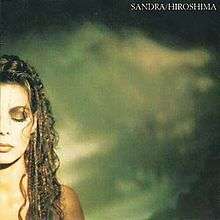Hiroshima (song)
"Hiroshima" is an anti-war song performed by British band Wishful Thinking, written by David Morgan and produced by Lou Reizner, which tells about the atomic bombing of Hiroshima. The track was recorded at the Chappell Recording Studios in London in 1970.[1] It was first released in 1971 as a single from their album of the same name, but achieved commercial success only upon its re-release in 1978, when it peaked at no. 8 in Germany, staying in the chart for 44 weeks. It was one of the best-selling singles of 1978 in Germany.
| "Hiroshima" | ||||
|---|---|---|---|---|
| Single by Wishful Thinking | ||||
| from the album Hiroshima | ||||
| B-side | "She Belongs to the Night" | |||
| Released | 1971 | |||
| Genre | Progressive rock | |||
| Length | 4:42 | |||
| Label | Global, Atlantic | |||
| Songwriter(s) | Dave Morgan | |||
| Producer(s) | Lou Reizner | |||
| Wishful Thinking singles chronology | ||||
| ||||
Charts
Sandra version
| "Hiroshima" | ||||
|---|---|---|---|---|
 | ||||
| Single by Sandra | ||||
| from the album Paintings in Yellow | ||||
| B-side | "La vista de luna" | |||
| Released | February 1990 | |||
| Genre | Pop | |||
| Length | 4:11 (single version) 6:50 (album version) | |||
| Label | Virgin | |||
| Songwriter(s) | David Morgan | |||
| Producer(s) | Michael Cretu | |||
| Sandra singles chronology | ||||
| ||||
| Music video | ||||
| "Hiroshima" on YouTube | ||||
"Hiroshima" is a 1990 single by German singer Sandra. It is a cover of a song written by David Morgan and first released by British band Wishful Thinking in 1971. The track was produced by Michael Cretu. Sandra decided to cover the anti-war "Hiroshima" out of her concern about the political unrest happening in countries like Lebanon, China and Romania in the late 1980s.[5] It was the first song recorded for her fourth album Paintings in Yellow and was released as the LP's lead single in February 1990.[6] It was commercially successful, particularly in Germany and Switzerland, where it reached the top 5 and remains one of Sandra's highest-charting singles. In Switzerland, it also peaked at no. 11 on the airplay chart.[7]
The music video for the song was directed by Roland Willaert. The clip was released on Sandra's VHS video compilation 18 Greatest Hits in 1992[8] and the 2003 DVD The Complete History.[9]
In 1999, a remix of the song was released on Sandra's compilation My Favourites. The track was remixed again for her 2006 compilation Reflections.
Formats and track listings
- 7" single
- A. "Hiroshima" – 4:11
- B. "La vista de luna" – 3:44
- 12" single
- A. "Hiroshima" (Extended Version) – 6:44
- B1. "Hiroshima" (Dub Mix) – 3:08
- B2. "Heaven Can Wait" (US-Remix) – 7:11
- CD maxi single
- "Hiroshima" (Single Version) – 4:11
- "Hiroshima" (Extended Version) – 6:44
- "Hiroshima" (Dub Mix) – 3:08
- "Heaven Can Wait" (US-Remix) – 7:11
Charts
Weekly charts
| Chart (1990) | Peak position |
|---|---|
| Europe (Eurochart Hot 100 Singles)[10] | 15 |
| France (SNEP)[11] | 16 |
| Germany (Media Control)[12] | 4 |
| Switzerland (Swiss Hitparade)[13] | 4 |
Other cover versions
- In 1982, East German band Puhdys released a single with a German-language version of the song. The cover appeared on their album Computer-Karriere.
- The song was also covered by German power metal band Freedom Call and included in the special edition of their first live album Live Invasion (2004).
References
- "WISHFUL THINKING Biography". www.wishfulthinking.de. Retrieved 2012-05-20.
- "WISHFUL THINKING - Singles 70". www.wishfulthinking.de. Retrieved 2012-05-20.
- "WISHFUL THINKING — HIROSHIMA" (in German). www.offiziellecharts.de. Retrieved 2019-06-19.
- "Top 100 Single-Jahrescharts" (in German). www.offiziellecharts.de. Retrieved 2019-06-19.
- "Sandra". Artistspecial. Stockholm, Sweden. 1990-05-04. Nordic.
- "Previews – Singles" (PDF). Music & Media. Vol. 7 no. 5. Amsterdam. 1990-02-03. p. 16. Retrieved 2019-06-20.
- "Playlist Report" (PDF). Music & Media. Vol. 7 no. 18. Amsterdam. 1990-05-05. p. II. Retrieved 2019-06-18.
- "18 Greatest Hits (The Video)". www.sandranet.com. Retrieved 2019-05-24.
- "Sandra - The Complete History (DVD, DVD-Video, PAL, Compilation, Stereo)". www.discogs.com. Retrieved 2019-05-24.
- "Eurochart Hot 100 Singles" (PDF). Music & Media. Vol. 7 no. 15. Amsterdam. 1990-04-14. p. IV. Retrieved 2019-06-18.
- "Discographie Sandra" (in French). lescharts.com. Retrieved 2009-04-25.
- "SANDRA — HIROSHIMA" (in German). www.offiziellecharts.de. Retrieved 2019-06-18.
- "Sandra" (in German). swisscharts.com. Retrieved 2009-10-26.
- "Eurochart Hot 100 Singles 1990" (PDF). Music & Media. Vol. 7 no. 51. Amsterdam. 1990-12-22. p. 36. Retrieved 2019-06-18.
- "Top 100 Single-Jahrescharts" (in German). www.offiziellecharts.de. Retrieved 2019-06-18.
- "Schweizer Jahreshitparade 1990" (in German). www.swisscharts.com. Retrieved 2019-06-18.